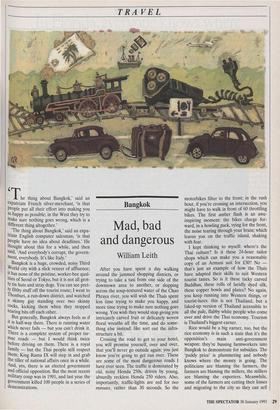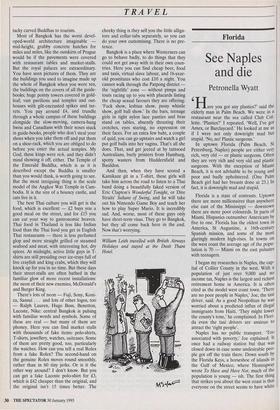TRAVEL
Bangkok
Mad, bad and dangerous
William Leith
'The thing about Bangkok,' said an expatriate French silver-merchant, 'is that people put all their effort into making you as happy as possible; in the West they try to make sure nothing goes wrong, which is a different thing altogether.'
`The thing about Bangkok,' said an expa- triate English computer salesman, 'is that People have no idea about deadlines.' He thought about this for a while, and then said, 'And everybody's corrupt, the govern- ment, everybody. It's like Italy.' Bangkok is a huge, crowded, noisy Third World city with a slick veneer of affluence; it has none of the pristine, worker-bee (pal- ates of Seoul or Tokyo, but it is not all grot- ty tin huts and stray dogs. You can see pret- ty filthy stuff off the tourist route; I went to Thonburi, a run-down district, and watched a skinny guy standing over two skinny Cocks, kicking them when they stopped tearing bits off each other.
But generally, Bangkok always feels as if it is half-way there. There is running water which never fails — but you can't drink it. There is a complete system of proper tar- mac roads — but I would think twice before driving on them. There is a royal family — but the Thai people still respect them; King Rama IX will step in and grab the tiller of national affairs once in a while. And, yes, there is an elected government and official opposition. But the most recent military coup was in 1991, and last year the government killed 100 people in a series of demonstrations.
After you have spent a day walking around the jammed shopping districts, or trying to take a taxi from one side of the downtown area to another, or slopping across the soup-textured water of the Chao Phraya river, you will wish the Thais spent less time trying to make you happy, and more time trying to make sure nothing goes wrong. You wish they would stop giving you intricately carved fruit or delicately woven floral wreaths all the time, and do some- thing else instead; like sort out the infra- structure a bit.
Crossing the road to get to your hotel, you will promise yourself, over and over, that you'll never go outside again: you just know you're going to get run over. These are some of the most dangerous roads I have ever seen. The traffic is dominated by old, noisy Honda 250s, driven by young, absurdly reckless Honda 250 riders. Also, importantly, traffic-lights are red for two minutes, rather than 30 seconds. So the
motorbikes filter to the front; in the rush hour, if you're crossing an intersection, you might have to walk in front of 60 throttling bikes. The first amber flash is an awe- inspiring moment: the bikes charge for- ward, in a howling pack, vying for the front, the noise tearing through your brain; which leaves you on the traffic island, shaking with fear.
I kept thinking to myself: where's the Thai culture? Is it these 24-hour tailor shops which can make you a reasonable copy of an Armani suit for £30? No that's just an example of how the Thais have adapted their skills to suit Western tourist tastes. So is it these tacky carved Buddhas, these rolls of luridly dyed silk, these copper bowls and plates? No again, you keep running into Western things, or tourist-lures: this is not Thailand, but a faked-up version of Thailand accessible to all the pale, flabby white people who come over and drive the Thai economy. Tourism is Thailand's biggest earner.
Rice would be a big earner, too, but the rice economy is in such a state that it's the opposition's main anti-government weapon: they're bussing farmworkers into Bangkok to demonstrate for subsidies. The `paddy price' is plummeting and nobody knows where the money is going. The politicians are blaming the farmers, the farmers are blaming the millers, the millers are blaming the exporters. Meanwhile, some of the farmers are cutting their losses and migrating to the city so they can sell tacky carved Buddhas to tourists.
Most of Bangkok has the worst devel- oped-world architecture imaginable mid-height, grubby concrete hutches for miles and miles, like the outskirts of Prague would be if the pavements were covered with restaurant tables and market-stalls. But the royal palaces are extraordinary. You have seen pictures of them. They are the buildings you used to imagine made up the whole of Bangkok when you were ten, the buildings on the covers of all the guide- books; huge pointy towers covered in gold- leaf; vast pavilions and temples and out- houses with gilt-encrusted spikes and tur- rets. You pay around £4, and trundle through a whole campus of these buildings alongside the slow-moving, camera-hung Swiss and Canadians with their noses stuck in guide-books, people who don't steal your shoes when you take them off and put them on a shoe-rack, which you are obliged to do before you enter the actual temples. My God, these kings were rich, and they didn't mind showing it off, either. The Temple of the Emerald Buddha, which is as it is described except the Buddha is smaller than you would think, is worth going to see. But the most intriguing thing is the scale model of the Angkor Wat Temple in Cam- bodia. It is the size of a bouncy castle, and cats live in it.
The best Thai culture you will get is the food, which is excellent — £2 buys you a good meal on the street, and for £15 you can eat your way to gastronomic heaven. Thai food in Thailand is less like Indian food than the Thai food you get in English Thai restaurants — there is less perfumed glop and more straight grilled or steamed seafood and meat, with interesting hot, dry spices. At midnight, active little guys in T- shirts are still presiding over ice-trays full of live crayfish and king crabs, which they will knock up for you in no time. But these days their street-stalls are often bathed in the familiar glow of more recent installations: the neon of their new enemies, McDonald's and Burger King.
There's lots of neon — Fuji, Sony, Koni- ca, Sansui . . . and lots of other logos, too — Ralph Lauren, Hugo Boss, Benetton, Lacoste, Nike: central Bangkok is pulsing with familiar words and symbols. Some of these are real — but many of them are phoney. Here you can find market stalls with thousands of fake items: polo-shirts, T-shirts, jewellery, watches, suitcases. Some of them are pretty good, too, particularly the watches. How can you tell a real Rolex from a fake Rolex? The second-hand on the genuine Rolex moves round smoothly, rather than in 60 tiny jerks. Or is it the other way around? I don't know. But you can get a fake Lacoste polo-shirt for £3, which is £42 cheaper than the original, and the original isn't 15 times better. The cheeky thing is they sell you the little alliga- tors and collar-tabs separately, so you can do your own customising. There is no pre- tence.
Bangkok is a place where Westerners can go to behave badly, to do things that they could not get away with in their own coun- tries. Here you can find cheap beer, food and taxis, virtual slave labour, and 16-year- old prostitutes who cost £10 a night. You cannot walk through the Patpong district the 'nightlife' zone — without pimps and touts racing up to you with placards listing the cheap sexual favours they are offering: `Fuck show, lesbian show, pussy whistle show, golf ball show.' In the bars, teenage girls in tight nylon lace panties and bras stand on tables, absently thrusting their crotches, eyes staring, no expression on their faces. For an extra few baht, a couple of quid, you can go upstairs and watch a girl put golf balls into her vagina. That's all she does. That, and get jeered at by tattooed Australians, burly printers from Hamburg, spotty wasters from Huddersfield and Basildon.
And then, when they have scored a Kamikaze git in a T-shirt, these girls will take him across the road to listen to a Thai band doing a beautifully faked version of Eric Clapton's Wonderful Tonight, or Dire Straits' Sultans of Swing, and he will take out his Nintendo Game Boy and teach her how to play Super Mario. It is incredibly sad. And, worse, most of these guys only have short-term visas. They go to Bangkok, but they all come back here in the end. Now that's worrying.
William Leith travelled with British Airways Holidays and stayed at the Dusit Thani Hotel.











































































 Previous page
Previous page